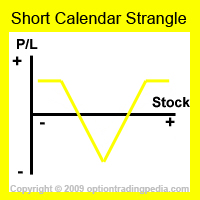How Does Short Calendar Strangle Work in Options Trading?
Short Calendar Strangle - Introduction
The Short Calendar Strangle is a volatile options strategy designed to profit when a stock is expected to stage a breakout in either direction.
The Short Calendar Strangle produces this effect by selling a long term Strangle while buying a short term Strangle. No matter which direction the stock breaks out, extrinsic value of all options involved would diminish as they go more and more in the money and out of the money. In this case, profit is made through the difference between the extrinsic value on the short long term options made and the loss of extrinsic value of the long short term options.
|
|
Difference Between Short Calendar Straddle and Short Calendar Strangle
The Short Calendar Strangle is different from the Short Calendar Straddle in that Short Calendar Straddle uses long term and short term Straddles while the Short Calendar Strangle uses long term and short term Strangles.
The effect of this difference is that the Short Calendar Strangle would require a lot lesser margin to put on but would also have a much lower maximum profit potential and a higher maximum loss potential than maximum profit potential. Therefore, if margin is a concern, the Short Calendar Strangle would be a better choice than the Short Calendar Straddle.
When To Use Short Calendar Strangle?
One could use a Short Calendar Strangle when the underlying stock is expected to breakout strongly to upside or downside quickly while minimizing margin requirement.
How To Use Short Calendar Strangle?
Short Calendar Strangles simply consist of a near term long Strangle and a longer term short Strangle. This means writing longer term out of the money call and put options while buying the same amount of nearer term out of the money call and put options.
|
Short Calendar Strangle Example :
Assuming XYZ trading at $44. It is February and XYZ is awaiting an important court verdict in March. Its Jun45Call is quoted at $1.10, its Jun43Put is quoted at $1.00, its Mar45Call is quoted at $0.75 and its Mar43Put is quoted at $0.70. Sell To Open QQQQ Jun45Call, sell To Open QQQQ Jun43Put Buy To Open QQQQ Mar45Call, buy To Open QQQQ Mar43Put Net Effect: ($1.10 + $1.00) - ($0.75 + $0.70) = $0.65 net credit. |
Profit Potential of Short Calendar Strangle:
The Short Calendar Strangle profits primarily from the diminished extrinsic value of the long term short options as they go in the money and out of the money as the stock breaks out. Intrinsic value losses are fully hedged by the short term long options, as such, the maximum profit of the short calendar Strangle is the difference between the extrinsic value of the long term options and short term options, which is the net credit received initially less residual extrinsic value.
Profit Calculation of Short Calendar Strangle:
Maximum Profit = net credit - residual value
|
Short Calendar Strangle Example :
Assuming XYZ rallies to $64. Its Jun45Call is quoted at $19.01, its Jun43Put is quoted at $0.01, its Mar45Call is quoted at $19.00 and its Mar44Put is quoted at $0.00. Net Profit: $0.65 - (($19.01 + $0.01) - ($19.00 + $0.00)) = $0.63. |
|
Short Calendar Strangle Example :
Assuming XYZ falls to $24. Its Jun45Call is quoted at $0.01, its Jun43Put is quoted at $19.01, its Mar45Call is quoted at $0.00 and its Mar43Put is quoted at $19.00. |
As you can see from the examples above, the Short Calendar Strangle makes the same maximum profit no matter which direction the underlying stock breaks out.
|
Short Calendar Strangle Example :
Assuming XYZ remains stagnant at $44. Its Jun45Call is quoted at $0.85, its Jun43Put is quoted at $0.75, its Mar45Call is quoted at $0.00 and its Mar43Put is quoted at $0.00. Net loss = ($0.75 + $0.70) - ($2.10 - $1.60) = $0.95 |
Risk / Reward of Short Calendar Strangle:
Maximum Profit: Limited.
Maximum Loss: Limited.
Break Even Points (Profitable Range) of Calendar Strangle:
Breakeven points of Short Calendar Strangle can only be determined through the use of an options pricing model such as the Black-Scholes Model.
Advantages Of Short Calendar Strangle:
Disadvantages Of Short Calendar Strangle:
Alternate Actions for Short Calendar Strangle Before Expiration :
1. The moment the extrinsic value of the long and short term options are almost completely eroded due to a significant breakout, the position should be closed and profit taken. There is no need to hold til expiration because the engine that makes this options trading strategy work is the breakout, not time decay.

|
Don't Know If This Is The Right Option Strategy For You? Try our Option Strategy Selector! |
| Javascript Tree Menu |
Important Disclaimer : Options involve risk and are not suitable for all investors. Data and information is provided for informational purposes only, and is not intended for trading purposes. Neither www.optiontradingpedia.com, mastersoequity.com nor any of its data or content providers shall be liable for any errors, omissions, or delays in the content, or for any actions taken in reliance thereon. Data is deemed accurate but is not warranted or guaranteed. optiontradinpedia.com and mastersoequity.com are not a registered broker-dealer and does not endorse or recommend the services of any brokerage company. The brokerage company you select is solely responsible for its services to you. By accessing, viewing, or using this site in any way, you agree to be bound by the above conditions and disclaimers found on this site.
Copyright Warning : All contents and information presented here in www.optiontradingpedia.com are property of www.Optiontradingpedia.com and are not to be copied, redistributed or downloaded in any ways unless in accordance with our quoting policy. We have a comprehensive system to detect plagiarism and will take legal action against any individuals, websites or companies involved. We Take Our Copyright VERY Seriously!
Site Authored by
